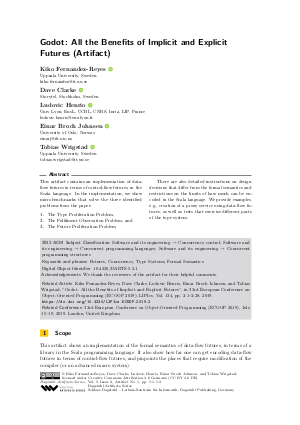Godot: All the Benefits of Implicit and Explicit Futures (Artifact)
Authors
Kiko Fernandez-Reyes  ,
Dave Clarke
,
Dave Clarke  ,
Ludovic Henrio
,
Ludovic Henrio  ,
Einar Broch Johnsen
,
Einar Broch Johnsen  ,
Tobias Wrigstad
,
Tobias Wrigstad 
-
Part of:
Issue:
Special Issue of the 33rd European Conference on Object-Oriented Programming (ECOOP 2019)
Part of: Volume: DARTS, Volume 5 (ECOOP 2019)
Part of: Conference: European Conference on Object-Oriented Programming (ECOOP)
Part of: Journal: Dagstuhl Artifacts Series (DARTS) - License:
 Creative Commons Attribution 3.0 Germany license
Creative Commons Attribution 3.0 Germany license
- Publication Date: 2019-07-12
Artifact Description

PDF
DARTS.5.2.1.pdf
- Filesize: 291 kB
- 2 pages
Document Identifiers
Subject Classification
ACM Subject Classification
- Software and its engineering → Concurrency control
- Software and its engineering → Concurrent programming languages
- Software and its engineering → Concurrent programming structures
Keywords
- Futures
- Concurrency
- Type Systems
- Formal Semantics
Metrics
- Access Statistics
-
Total Accesses (updated on a weekly basis)
0PDF Downloads0Metadata Views
Abstract
This artifact contains an implementation of data-flow futures in terms of control-flow futures, in the Scala language. In the implementation, we show microbenchmarks that solve the three identified problems from the paper: 1) The Type Proliferation Problem, 2) The Fulfilment Observation Problem, and 3) The Future Proliferation Problem There are also detailed instructions on design decisions that differ from the formal semantics and restrictions on the limits of how much can be encoded in the Scala language. We provide examples, e.g., creation of a proxy service using data-flow futures, as well as tests that exercise different parts of the type system.
Cite As Get BibTex
Kiko Fernandez-Reyes, Dave Clarke, Ludovic Henrio, Einar Broch Johnsen, and Tobias Wrigstad. Godot: All the Benefits of Implicit and Explicit Futures (Artifact). In Special Issue of the 33rd European Conference on Object-Oriented Programming (ECOOP 2019). Dagstuhl Artifacts Series (DARTS), Volume 5, Issue 2, pp. 1:1-1:2, Schloss Dagstuhl – Leibniz-Zentrum für Informatik (2019)
https://doi.org/10.4230/DARTS.5.2.1
BibTex
@Article{fernandezreyes_et_al:DARTS.5.2.1,
author = {Fernandez-Reyes, Kiko and Clarke, Dave and Henrio, Ludovic and Johnsen, Einar Broch and Wrigstad, Tobias},
title = {{Godot: All the Benefits of Implicit and Explicit Futures}},
pages = {1:1--1:2},
journal = {Dagstuhl Artifacts Series},
ISSN = {2509-8195},
year = {2019},
volume = {5},
number = {2},
editor = {Fernandez-Reyes, Kiko and Clarke, Dave and Henrio, Ludovic and Johnsen, Einar Broch and Wrigstad, Tobias},
publisher = {Schloss Dagstuhl -- Leibniz-Zentrum f{\"u}r Informatik},
address = {Dagstuhl, Germany},
URL = {https://drops.dagstuhl.de/entities/document/10.4230/DARTS.5.2.1},
URN = {urn:nbn:de:0030-drops-107786},
doi = {10.4230/DARTS.5.2.1},
annote = {Keywords: Futures, Concurrency, Type Systems, Formal Semantics}
}
Author Details
Acknowledgements
We thank the reviewers of the artifact for their helpful comments.
Artifact
DARTS-5-2-1-artifact-d90b8cda99ad792ac9e97f65184087e9.zip
(Filesize: 2.73 GB)
MD5 Sum:
d90b8cda99ad792ac9e97f65184087e9
(Get MD5 Sum)
Related Article
- Kiko Fernandez-Reyes, Dave Clarke, Ludovic Henrio, Einar Broch Johnsen, and Tobias Wrigstad, "Godot: All the Benefits of Implicit and Explicit Futures", in 33rd European Conference on Object-Oriented Programming (ECOOP 2019), LIPIcs, Vol. 134, pp. 2:1 - 2:28, 2019. https://dx.doi.org/10.4230/LIPIcs.ECOOP.2019.2
